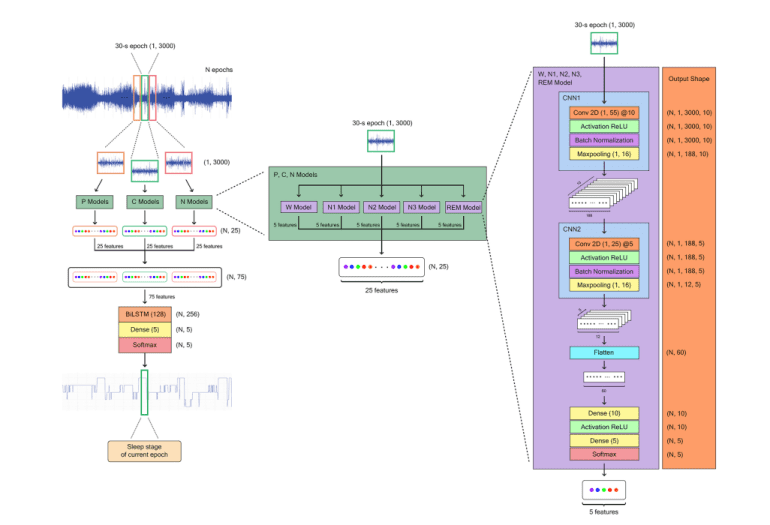- ZleepAnlystNet revolutionizes sleep stage analysis with deep learning expertise.
- Polysomnography, the standard in diagnosing sleep disorders, often relies on manual classification, leading to inconsistencies.
- ZleepAnlystNet, developed by Mahidol University, employs a unique ‘separating training’ method with specialized components for enhanced accuracy.
- The model achieves impressive metrics, including an 87.02% overall accuracy and notable performance in identifying challenging sleep stages like N1.
- Cross-dataset validation confirms the model’s robustness and potential for widespread clinical adoption.
Main AI News:
The analysis of sleep patterns is a cornerstone in comprehending human well-being, shedding light on the intricate relationship between rest and health. Polysomnography, the gold standard in diagnosing sleep disorders, employs an array of sensors to monitor crucial signals during sleep, including brain waves (EEG), eye movements (EOG), and muscle activity (EMG). However, the conventional method of manually categorizing sleep stages is not only laborious but also susceptible to inconsistencies stemming from human error.
In response, researchers have embraced automated solutions to enhance accuracy and alleviate the workload on sleep technicians. Modern computerized systems leverage various machine learning approaches, from rudimentary algorithms based on pre-defined features to cutting-edge deep learning architectures capable of directly processing raw EEG data. These innovations strive to replicate the precision of human analysis while outperforming in terms of efficiency and consistency.
A pioneering development in this domain comes from the esteemed Mahidol University: ZleepAnlystNet. This groundbreaking deep-learning model is meticulously crafted for sleep stage classification, employing a novel ‘separating training’ technique. Here, individual components undergo specialized training to amplify their proficiency in identifying distinct sleep stages. The framework comprises fifteen convolutional neural networks (CNNs) meticulously designed to capture diverse EEG signal characteristics, complemented by a bidirectional long-short-term memory (BiLSTM) network for precise sequence classification.
The efficacy of ZleepAnlystNet is nothing short of remarkable. Boasting an overall accuracy of 87.02%, a macro F1 score (MF1) of 82.09%, and a kappa coefficient of 0.8221, the model demonstrates exceptional alignment with standard sleep stage scoring protocols. Particularly noteworthy is its prowess in handling challenging stages such as N1, where it achieves an impressive per-class F1 score of 54.23%. Moreover, ZleepAnlystNet exhibits consistent performance across other stages, including Wake (W), N2, N3, and rapid eye movement (REM), with F1 scores of 90.34%, 89.53%, 88.96%, and 87.40% respectively.
The robustness of ZleepAnlystNet extends beyond mere metrics, as evidenced by cross-dataset validation experiments. Even when applied to external datasets, the model showcases formidable performance, underscoring its potential for widespread clinical adoption. The success of this model can be attributed in part to its unique training methodology, which meticulously optimizes each model component in isolation. This approach facilitates fine-tuning of the model’s architecture, ensuring optimal performance without compromising overall efficacy.
ZleepAnlystNet epitomizes the fusion of cutting-edge technology with healthcare advancement, offering a transformative solution to the challenges plaguing traditional sleep analysis. With its exceptional accuracy, reliability, and adaptability, this innovative deep-learning model heralds a new era in sleep medicine, promising improved diagnostic capabilities and enhanced patient care.
Conclusion:
The introduction of ZleepAnlystNet represents a significant advancement in sleep analysis technology. Its exceptional accuracy and reliability, coupled with cross-dataset validation, position it as a transformative solution for the healthcare market. ZleepAnlystNet’s ability to streamline sleep stage classification has the potential to revolutionize diagnostic practices, improve patient care, and drive efficiency in sleep medicine. This innovation presents lucrative opportunities for healthcare providers and technology developers alike, paving the way for a more efficient and effective approach to sleep disorder diagnosis and treatment.

